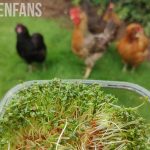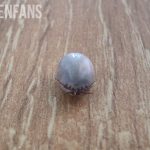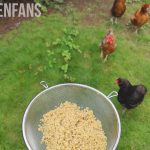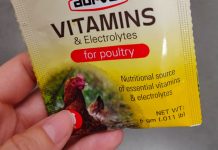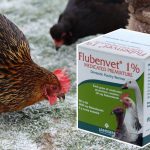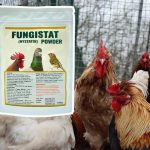Can Chickens Eat Cucumbers & Cucumber Peels?
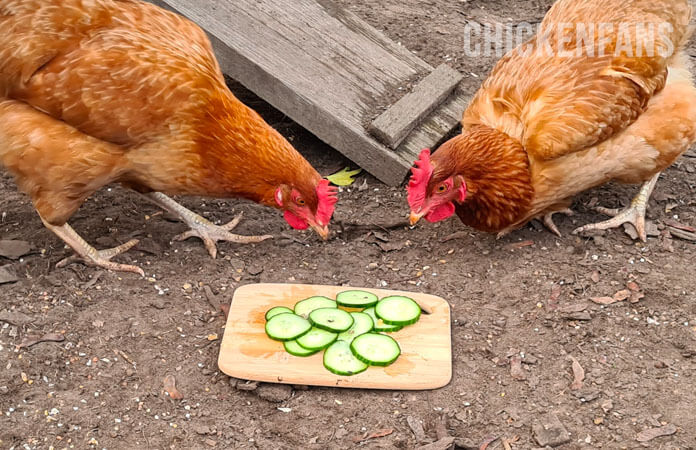
Every healthy bowl of salad comes with some cucumber. Don’t toss away the scraps and peels: they are loaded with essential nutrients for your backyard flock. Chickens can eat all parts of the cucumber!
Nutrients | Health Benefits | Amount | Peels | Seeds | When to avoid
Can Chickens Eat Cucumbers?
Yes, chickens can eat cucumbers, cucumber peels, and cucumber seeds. You can feed them table scraps, as cucumbers are a healthy food source rich in minerals and vitamins A, C, and B6. Cucumbers can keep your chickens hydrated, boost their immune system, and help your flock see in dim lights.
Nutritional Value of Cucumbers for Chickens
Cucumbers are low in calories, contain a lot of water and fiber, and come with many healthy micronutrients. They don’t contain many carbs and proteins, so they can’t replace regular food, but cucumbers certainly are a healthy treat for chickens.
| 100g Cucumber | Amount | % DV Laying Hen |
|---|---|---|
| Calories | 15 kcal | ~5 % |
| Water | 95,2 g | – |
| Protein | 0,65 g | ~3,6 % |
| Carbs | 3,63 g | – |
| Fiber | 0,5 g | – |
| Sugar | 1,67 g | ~5,6% |
| Vitamin A | 105 IU | ~3,5% |
| Vitamin C | 2,8 mg | ~2,8% |
| Vitamin B6 | 40 µg | ~1,3% |
| Vitamin E | 0,03 g | ~0,2% |
| Vitamin K | 16,4 µg | ~0,5% |
| Potassium | 147 mg | – |
| Calcium | 16 mg | ~ 0,4% |
One-third of a single cucumber (100g) is only 15 calories but provides about 3,5% of the daily recommended value of vitamin A for laying hens. Cucumber also contains vitamins C, E, K, and B6, as well as several minerals and traces of calcium.
- Vitamin A is essential for several metabolic processes and helps chickens see in dim light and shady conditions. It’s essential for fertility, the immune system, and growth in chickens.
- Vitamin C is an antioxidant, vital for tissue growth and blood vessels, and involved in many body functions and the proper functioning of the immune system.
- Vitamin B6 is vital for the metabolism of the nervous system and the immune system
Cucumbers also provide minerals that chickens need for their bones, muscles, heart, and brain to work properly.
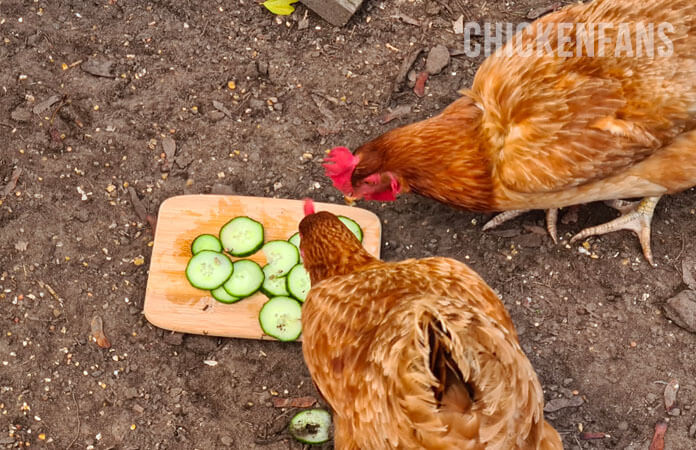
Health Benefits of Cucumber for Chickens
Cucumber comes with several health benefits for egg-laying hens and broilers:
- It keeps the chickens hydrated: chickens need water to regulate their body temperature; water also plays a vital role in digestion and the organ functions
- It helps them regulate their body temperature: the water, minerals, and electrolytes in cucumber allow chickens to cool down from heat stress
- Boosts the immune system: several antioxidants, and vitamin C, reduce oxidative stress and inflammation that are linked to several diseases
- Improves Digestion: the high fiber content in cucumber helps bowel movement and bacteria growth in the chicken’s guts
- May lower blood sugars: research on animals suggests that eating cucumber reduces blood sugar levels.
Most people think cucumbers are vegetables, but botanically it’s actually a fruit. So it does comes with some sugars, albeit a very small amount. Most of the sugars in cucumber also have a very low glycemic index and do not spike the blood sugar levels of chickens much.
How Many Cucumbers can Chickens Eat?
Chickens can eat cucumber in abundance. However, it can’t replace regular food, so make sure they are still consuming enough of their regular feed.
Treats should generally be limited to about 5% of the feed intake. However, for cucumbers, it’s hard to put such a limit, as it’s a healthy food source. It’s nearly impossible to overfeed chickens on cucumber. If you have some table scraps, your flock will be happy to help you out.
Can Chickens Eat Cucumber Peels?
Yes, chickens can eat cucumber peels. They are rich in fiber and vitamin A, which helps the chicken’s digestive system and helps them see in dim light. A chicken’s stomach is built to digest fibrous plant food, and our birds can handle the dense fibers of the cucumber skin very well.
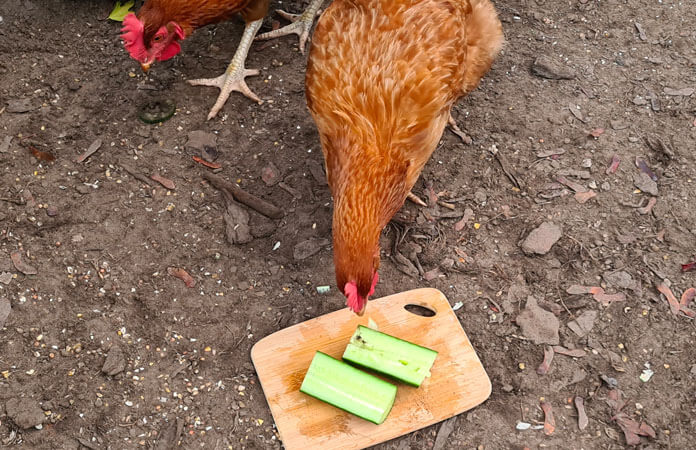
Can Chickens Eat Cucumber Seeds?
Yes, chickens can eat cucumber seeds. They are the most nutrient-dense part and contain a lot of beta-carotene, a powerful antioxidant. The chicken’s body converts beta-carotene to vitamin A, which is vital for your chicken’s eye health.
When Not to Feed Cucumbers to Chickens?
Cucumbers are generally safe as long as they are free from pesticides and mold. Only give your chickens cucumbers that you would eat yourself. Avoid cucumbers with yellow areas, sunk-in spots, or over-ripe wrinkled ends.
Avoid molds at all times. Molds are dangerous for chickens, affect their digestive system, and can cause dangerous infections.
You should also avoid feeding them very long blades of cucumber peels. Chickens don’t have teeth and can’t chew on the blades. Long thin blades can get stuck in their crops.
You can feed the cucumbers raw and cooked. However, avoid giving them cucumber salads containing dressings or food chickens can not eat, like onions.
Related Cucumber Food Sources for Chickens
Cucumbers are typically part of salads:
- Avoid feeding onions to chickens if they are in a salad mix with cucumbers
- Be careful with feeding tomatoes to chickens as they contain tomatine, which can irritate chickens
There are some alternatives to cucumber to keep your chickens hydrated:
- Feeding watermelon can be another hydrating treat on hot summer days
- Feeding your hens small amounts of oranges can be a refreshing treat
If you want to learn more about chicken feed, please consult our ‘Chicken Food Page‘ to go and see every specific food article we address, including all articles on what chickens can and can not eat. Or go to our listicle food summary on ‘The Classroom‘.

